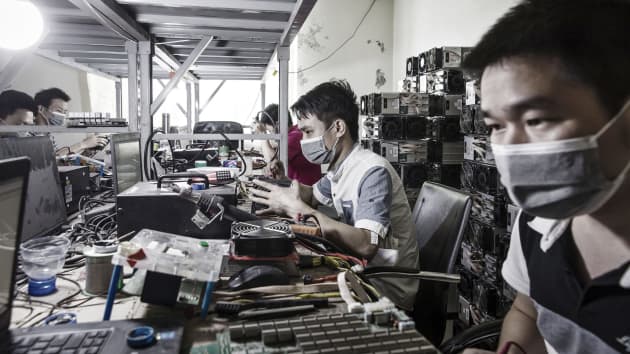Revealing the trick to help Bitcoin miners bypass Chinese authorities
- Tram Ho
Bitcoin Miners Won’t Leave China
Like other miners in China, Ben, who only agreed to provide a nickname, has gone underground since Beijing cracked down on the industry earlier this year. Now, he and his like-minded people must constantly be creative to avoid detection.
Ben arranges his Bitcoin mining equipment in various locations so as not to draw attention to the amount of electricity they consume. This guy even chooses to “go through the back door”, getting power from systems that are not yet connected to the national grid, such as dams. In addition, Ben also performed many tricks to erase traces of himself on digital assets.
Ben says he’s used to adapting when he runs a business in China, but over the past six months, it’s pushed his adaptation to the next level. “We don’t know how determined the Government will be to get rid of cryptocurrency mining,” Ben said.

Although Beijing has been very aggressive with cryptocurrency mining activities, CNBC sources believe that about 20% of all Bitcoin miners are still active in China. This figure is quite low compared to the peak of about 65-75% of crypto mining taking place in China but it is far from zero.
Data from Chinese cybersecurity firm Qihoo 360 shows that underground cryptocurrency mining operations are thriving in China. In their November report, the team estimated that an average of 109,000 crypto mining IPs are active in China on a daily basis. Most of them are in Guangdong, Jiangsu, Zhejiang and Shandong provinces.
Cryptocurrency mining still exists in China because part of the miners do not believe that China will actually wipe out cryptocurrencies. The past shows that on many occasions China wanted to be aggressive with cryptocurrencies, but then they eased the tension. That is why many miners believe that China’s ban will soon no longer be as valid as it was in the beginning.
Risky gamble
However, it is a risky bet. It seems that this time, China not only wants to prevent cryptocurrencies, but also make them unable to consume too much electricity, especially in the context that China is reeling from the worst energy crisis in the past decade, leading to to rotating power cuts in many areas, including industrial centres.
China has made it clear that cryptocurrency mining is hindering its climate goals as the world’s second-largest economy strives to bring net emissions to zero by 2060. Back in November, a spokesman for the government Meng Wei’s government has criticized Bitcoin mining activities and called them extremely harmful and affirmed that it will tighten regulations on these activities.
In addition, cryptocurrencies also face competition from digital currencies. China is experimenting with using an electronic version of its currency. This could lead to more efforts by local governments in cracking down on cryptocurrency mining. Preventing other currencies from remaining in the system also increases the value of the digital currency.

Currently, the Chinese authorities are paying special attention to the electricity consumption of research centers, community centers, schools, etc., which have preferential electricity use. However, if it is discovered that subsidized subjects are secretly supporting cryptocurrency mining activities, China will increase electricity prices as punishment.
Last week, China’s Central Commission for Discipline Inspection announced that it had discovered dozens of state-owned agencies and organizations in eastern China’s Zhejiang province that were using public resources. to mine 12 cryptocurrencies, including bitcoin, ether, litecoin and monero. Of the nearly 50 people fined, 21 worked at Chinese enterprises or state agencies.
In the coastal region of Jiangsu, the watchdog found that 21% of IP addresses involved in cryptocurrency mining were from state-owned organizations.
Despite considerable efforts from the authorities, people like Ben are still finding ways to stay undetected. Some people move equipment to other countries but some stick around, especially with small and mid-sized companies. This is also the object most affected by Beijing’s ban, especially when it is not possible to reduce the equipment load to compensate for the loss but also cannot exploit the full capacity because the amount of electricity will skyrocket quickly.
” Cryptocurrency mining has ceased to be a large-scale business. Instead, the industry has become fragmented on a smaller scale. A few thousand miners in this area, a few thousand miners are in another area, ” one veteran miner said on condition of anonymity.
Disperse to avoid detection
Ben, who started mining cryptocurrencies in 2015, has a plowing pool of thousands of units. However, only 1,000 mining rigs are connected to the grid. The remaining 5,000 mining rigs are connected to hydroelectricity, directly using electricity from the source in Sichuan province, southern China. With miners relying on the grid, Ben says they have to be dispersed across the country in order not to draw attention to the authorities.
“They’re everywhere. You can’t find a common pattern,” says Ben of mining equipment that connects to industrial power lines wherever possible. In addition, the high cost is also what makes miners not interested in grid electricity. Using electricity off-grid allows for higher profit margins and is easier to operate.
However, hydropower has its weaknesses. The rainy season in China lasts from May to late autumn. When the ban was issued, cryptocurrency miners flocked to Sichuan and Yunnan, two of the provinces with abundant hydroelectric power thanks to the decentralized dams system. Compared to the coal power plants in Xinjiang and Inner Mongolia, this place is much easier to hide.

In fact, even before the ban, miners rented or built their own transformers and substations. This electricity will be supplied to the mines. In Sichuan, Ben pays a one-time fee to rent an entire off-grid power plant. That’s Ben’s way of avoiding detection.
However, China is not unaware of this situation. China Telecom, China’s largest telecommunications company, has doubled down on its sweeping operations to detect suspicious mines. This information will then be passed on to the central government and then down to the local government, leading to investigations.
Ben considers himself lucky because he cooperates well with the owner of the thermal power plant. When being investigated, this man covered for Ben. After the call, Ben stopped mining for a few days and took some steps to mask the mine’s Internet traffic during cryptocurrency mining. Once done, the mine is back to normal.
Besides, Chinese miners also strengthen cooperation with miners around the world to strengthen their power. Specifically, instead of signing the mined cryptocurrency, groups in China now choose to do the opposite to conceal their whereabouts. However, the cooperation will still ensure their benefits.
” We don’t have to disclose any information about us. Basically, don’t be foolish to brag to the world that your revenue is only half of what you have ,” Ben said and explains why China’s Bitcoin mining market share went to zero overnight. Simply because they voluntarily share data with other groups.
Source : Genk
